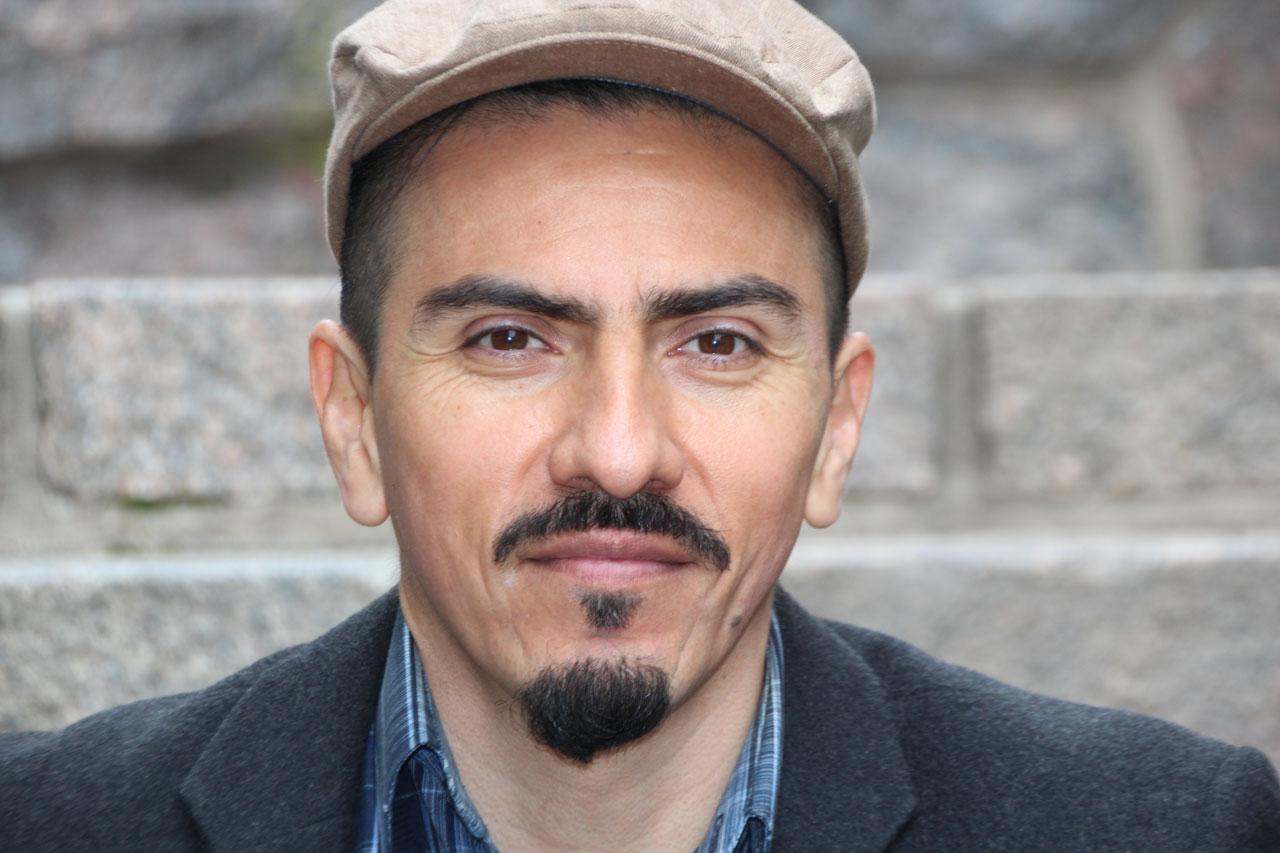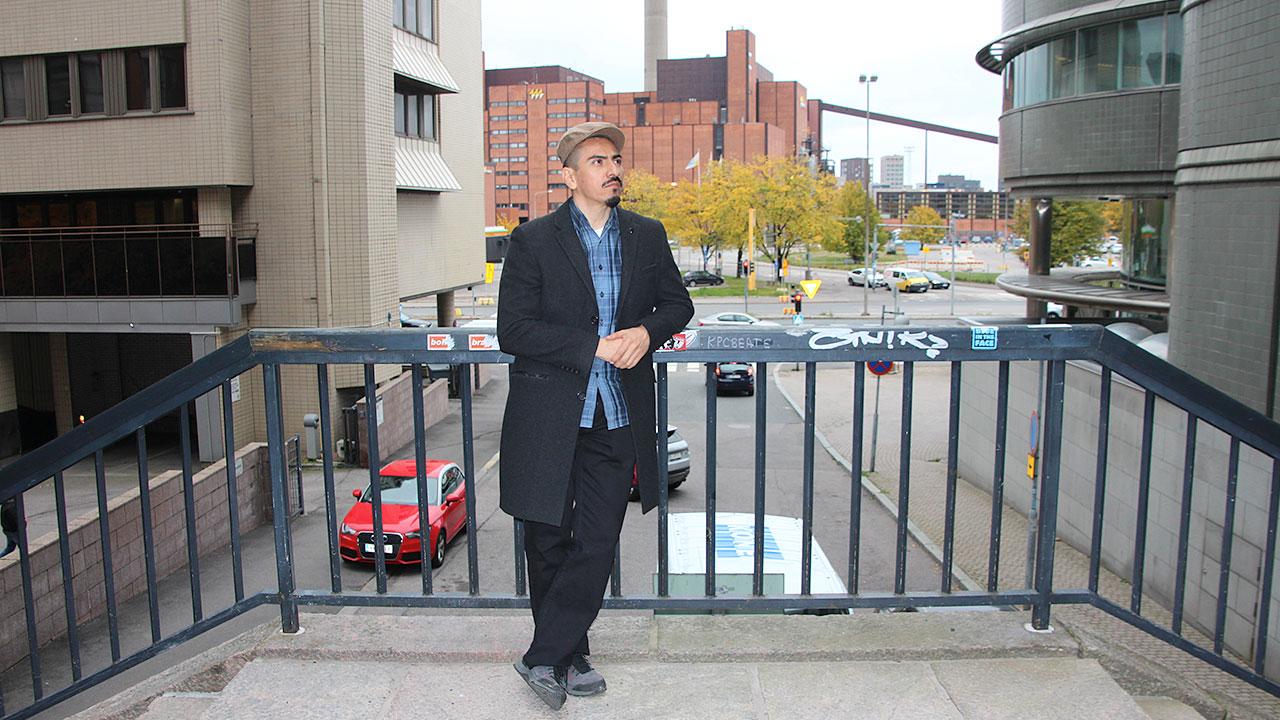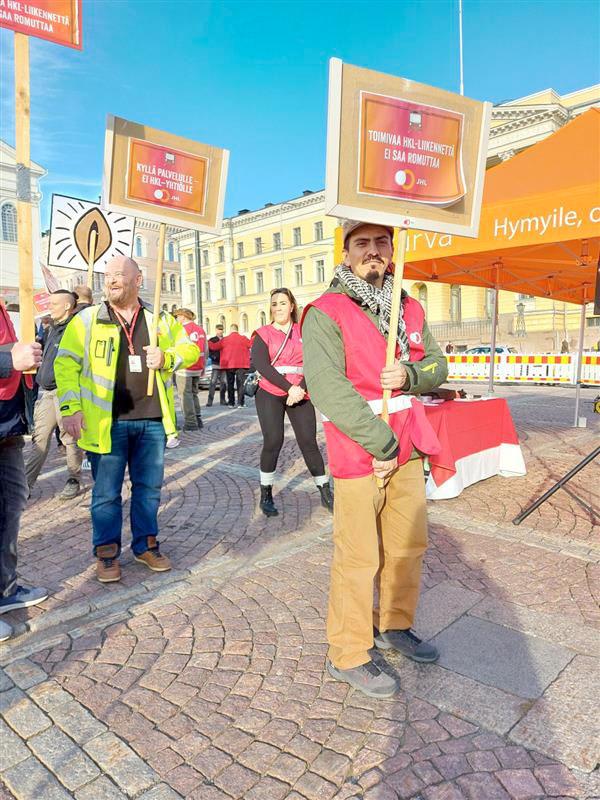Trade Union JHL’s services are closed on Easter. The telephone services of Membership Service, Education Advice, and Employment Advice are closed on Friday 18 April and Monday 21 April.
Abraham Cano fought for employees in Mexico – The lawyer is now working towards making Latinos who have moved to Finland dare to unionise: A large number of people in Finland is afraid to join the union

In Latin America, being a trade union active can literally kill you. Labour law lawyer Abraham Cano fought for employee rights in Mexico for 15 years and played punk. He then came to Finland and was caught by surprise.

Interpreter
How would you feel if the reward for your day's work was a five-euro note and some coins?
What if you had no right to occupational healthcare or shift differentials? If your job was hanging by a thread because of an oral employment contract? If pay raises or paid leave were beyond your wildest dreams?
Welcome to Mexico, where the things described above are a part of employees’ daily life. The general minimum wage is a little over 140 pesos, about six euros per working day. There are over 50 million employees in Mexico. Well over half of them carry out their work unofficially, without a written employment contract and terms and conditions of employment.
Mexico is a state with 130 million inhabitants, the second largest country in Latin America, and a class society where those carrying out manual labour are in a miserable position.
The reality in Finland is very different compared to Mexico.
It is not much use to be a trade union member. Many Mexican unions are exploiters comparable to criminal organisations, and they are not on the employees’ side. Going against the employer’s will may lead to losing one’s job, persecution and, at worst, death.
The gap between the poor, the middle class and the wealthy class is one of the largest in the world. One per cent of the people owns 31 per cent of the national wealth. The situation of the population at large has deteriorated since the 80s, because wages are stuck in place while inflation has increased the price of living.

Abraham Cano completed his language training in a Finnish day care centre, and he has learned about the Finnish education and day care system. In JHL, he has familiarised himself with Finland's trade union movement.
Labour law lawyer Abraham Cano, 45, sits in JHL's central office in Helsinki and furrows his brows.
– The reality in Finland is very different compared to Mexico, he states.
Cano grew up in México, the capital of Mexico. For nearly two decades, he fought for the rights of Mexican low-pay employees. Cano moved to Helsinki a year and a half ago. Now, his goal is to get Finnish people with an immigrant background to join trade union activities.
Read more: JHL’s third immigrant network has been founded, it only needs a name: Sunitha Akurathi and Michaël Fandi hope that the network will give them encounters, peer support and information about working life
According to Cano, it is almost incomprehensible to a Mexican how strong and democratic the Finnish trade union movement is, and how it stands up for the employees. In his opinion, one must hold on to this at any cost. Cano wants to do his best for Finland to succeed at this.
Life has brought Cano from a North American megacity to a suburb in Helsinki and to doing on-the-job learning for JHL’s two-year immigrant project, the goal of which is to get those with an immigrant background to join the union.
He has a story to tell about how he ended up in his new home country to fight for the trade union movement’s future. First however, we will return to Mexico in the 70s, 80s and 90s.
No way to close one's eyes from oppression
Abraham Cano was born in México in the spring of 1976. His mother worked as a secretary in a bank, his father was an architect. His middle-class background guaranteed an income and a chance to go for his dreams. However, it was impossible to close one’s eyes from working class oppression in the divided metropolis.
Cano found his spiritual home within the punk movement. He played the drums in a punk band, the lyrics of which dealt with, say, the oppression of countryside workers and indigenous people. He soon understood that it is his calling to defend those who are weaker.
Few are privileged enough to have a written employment contract.
Cano spent his youth amidst a deepening class divide and corruption. The young man’s eyes opened to the injustice of the system in his first real jobs. Cano moved away from home when he was 16 and earned a living working in a flower shop and record store, among others. He studied labour law at UNAM, one of the largest universities in Latin America, and witnessed the degradation of those less privileged.
– I had a written employment contract and terms and conditions of employment in the jobs I had. I was aware that few people are privileged enough to work in such a workplace.

In Finland, immigrant integration has received criticism for being stiff and bureaucratic. Abraham Cano disagrees. He is impressed by how Finland supports foreigners with getting an education and access to working life.
Cano worked as an independent labour law lawyer for 15 years. He defended mine workers, employees for the Mexican oil company Pemex and healthcare employees in court, among others.
When the case was politically significant on a national level, it was often impossible to win it, seeing as the judicial system was a puppet of the state. In labour law issues, the Government often had the last word instead of an impartial labour law court.
Cano points out that this was no ordinary legal work. As a labour law lawyer, he was automatically a civic activist, too. It was no use to think one could survive in a courtroom with legal knowledge alone.
– Unlike a regular lawyer, I took part in strikes, marches and meetings. I was also in the centre of events when trade union actives clashed with the police. There have been dramatic situations in these clashes. Some employees have died for their rights.
When the collective agreement exploits the employees
The Mexican state not only controls the judicial system but the trade union movement as well. Employees either work in the private sector or state sector. Those who work for the state do not have the right to freely unionise. They must join a state-controlled union that represents their occupational sector. These unions are tools for the employers. The terms and conditions of employment are lousy, and it is in practice impossible to earn the right to strike.
Abraham Cano and other trade union actives are tilting at ancient windmills. The corrupted and undemocratic trade union movement has its roots in the Mexican Revolution of 1918. After the revolution, the Government started to form trade unions. In the 1930s, unions for railway employees, mine workers and those working in the oil sector were founded.

Abraham Cano demonstrated for local transport employees in Helsinki in September.
Their operations and leadership were and are thoroughly corrupted. The state is controlling the unions with an iron fist, and the union leaders are pressuring members not to fight for their rights.
– The state-controlled unions are real gangsters. They don’t hesitate to treat employees and also their representatives with violence, Abraham Cano says.
I'm impressed by the Finnish trade union movement. Unions defend their members’ interests here!
Later on, Mexico entered into free trade agreements with the USA and Canada. Thanks to the agreements, companies obtained labour from Mexico at a dirt-cheap price. This resulted in a vicious cycle of exploitation where the elite and state together exploit the working class.
In the 1980s, a so-called protection agreement system arose. Trade unions came up with collective agreements that were only promoting the interests of employees on paper. In reality, the agreements had been concluded by the employers and, instead of guaranteeing the employees’ terms and conditions of employment, the agreements robbed the employees of them. There are also some Finnish companies, including Metso and Nokia, that have been called to account for abusing the protection agreement system in Mexico.
– Unions are still being controlled by both the Mexican state and employers, Abraham Cano states.
The current leftist president has started to change the legislation. The court is now dealing with labour law issues instead of the Government. The Government has guaranteed the employees the right to join a trade union of their choosing. It has also decided that a trade union will not be identified as being competent unless it has the direct support of the employees. At the same time, minimum wages have been increased a slight bit.
The change is historic – earlier, most employees had to belong to unions that were not promoting their interests in any way.
– However, making working life fair is a battle that will last at least dozens of years, Abraham Cano estimates.
Join the union without fear
In many countries of the world, it is dangerous or even against the law to be a trade union member. Some people from these countries have even come to Finland. They have a deeply suspicious attitude about unionisation. About 5,000 people have moved here from Latin America. A fifth of them have come from Mexico. Many of them work in sectors covered by JHL but are not union members.
In Latin America, being a trade union active can kill you. One challenge for the Finnish trade union movement is to make it clear that unionisation is safe here.
Abraham Cano has a dream of opening up the Finnish trade union movement more to people with an immigrant background. His on-the-job learning in JHL’s immigrant project has already opened up ways of attracting more members of Latino origin to JHL.
Cano’s on-the-job learning will last for six weeks. It is related to the TE Office's integration program. The first weeks have already made his jaw drop. For instance, tripartite collective agreement negotiations come across as surprising to someone used to how things are done in Mexico.
– I'm very impressed by the Finnish trade union movement. Unions truly defend their members’ interests here!
Cano’s expression has been serious throughout the interview. His frown becomes a smile when the talk turns into the Finnish pension system, child increments and women's rights. In Mexico, maternity leave only lasts six weeks before the due date and another six weeks after giving birth. After that, the mother must return to work.
– Mexican women would flock to Finland if they knew that a woman has the right to care for her child for two years at home after giving birth without losing her job! The fact that Finland is already considering extending paternity leave is unbelievable.
Happy coincidence opened the way to Finland
Nine years ago, Abraham Cano was on a holiday in Finland when he met a woman working with immigrant rights. Now, their children are four and six years old. The younger child was born in Helsinki, the older one in Mexico. Although Cano loves Mexico, the family decided to settle in Finland. It is easier to provide a safe living environment for the children here.
The eternal punker’s drums and guitar are well stored with family members in México.
– Right now, the time spent with my children is more important than anything else.
Cano is determined to make room for himself in the Finnish society. He already speaks rudimentary plain Finnish, spends five hours a day studying the language of his new home country and does homework for two-three hours on top of it. He is very motivated: In five years time, Abraham Cano wants to earn a living spreading the work about labour law and the trade union movement to Finnish people with an immigrant background who have come here from all over the world.
He thinks that Finnish people are incredible.
– I'm very privileged to be living in a country with a culture this rich and diverse.
Four ways to get immigrants involved!
Abraham Cano is delighted about the high degree of unionisation in Finnish trade unions. However, the downward trend of unionisation worries him. According to him, getting immigrants involved is one of the most important methods for maintaining a high level of unionisation.
1 Explaining directly
– It’s important to explain directly and exactly to immigrants what the significance and benefits of unionisation are. One must also be able to explain understandably why it is much more useful for an employee to belong to the union than to the General unemployment fund alone.
2 Understanding
– Many people of Latino origin work in occupations covered by JHL in Finland. Attracting them to the union requires us to understand the situation in which they've lived. Otherwise, it is impossible to enlighten them. We need to be able to dispel the prejudice that unions are corrupted and undemocratic.
3 Same language
– It’s not easy to learn Finnish. Therefore, it’s necessary to inform in each group’s own language. We must utilise social media to communicate about the significance of organisation into trade unions in various languages.
4 Diversity
– Unions must take into account the diversity of their members and potential members. I'm grateful for this on-the-job learning in JHL's immigrant project. The project is a pioneer aiming for this goal in particular.